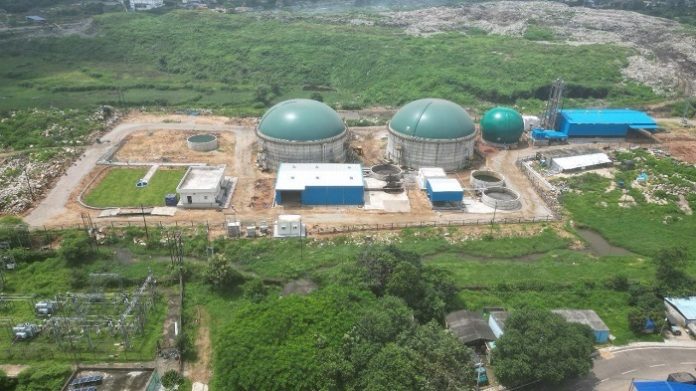Prime Minister Narendra Modi inaugurated GAIL (India) Limited’s first CBG Plant in Ranchi, Jharkhand, in partnership with CEID Consultants, LSTK/EPC contractor for the plant. The 12,500 m³ per day capacity plant is designed to process 150 tons of municipal solid waste to produce 5,000 kg Bio-CNG and 25 tons of fermented bio manure per day.
The plant is built in an area of 7.86 acres at Ranchi Jharkhand, Jhir Dumping Site Mouza Jhiri. The biogas generated in the facility is to be supplied to nearby CNG stations, which can fuel over 600 vehicles per day in the region.
The plant’s purification process utilizes water scrubbing technology. Additionally, the entire process, from designing and supplying to installing, testing, and commissioning the biogas plant is managed by CEID Consultants and Engineering.
They will deliver overall turn-key solutions including gas generation, gas purification and pre-treatment process for the CBG plant. The wet waste for the plant to be collected by Ranchi municipal from homes, businesses, and other sources within Ranchi.
As per the press release, in March 2021, GAIL and Ranchi Municipal Corporation signed a Concession Agreement (CA) in the presence of Chief Minister of Jharkhand Hemant Soren to set up the plant.
Prince Gandhi, CEO and Founder of CEID Consultants & Engineering Pvt Ltd said, “We are happy to announce the successful commissioning of GAIL India Ltd’s first compressed biogas facility in India. This plant has double significance since it is also the first plant in the state of Jharkhand. This plant promotes the circular economy and the state’s local economy with a sustainable future by utilizing Ranchi Municipal garbage and cow dung to generate clean energy. GAIL’s plant in Ranchi will not only create local employment and boost rural economies, but it will also promote energy security and lessen India’s reliance on fossil fuels”.
He further added, “The project will support government initiatives as Waste to Wealth, Circular Economy, Make in India, Clean India Green India, Net Zero by 2038 for reducing carbon footprints and what not.” he also emphasizes the environmental benefits of the byproducts from these plants and stated that, “Organic manure that produces as a byproduct from this plant can be use as natural fertilizers as well, enhancing soil fertility and health at the farming fields”.

































